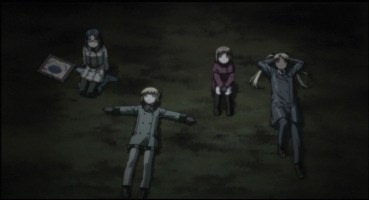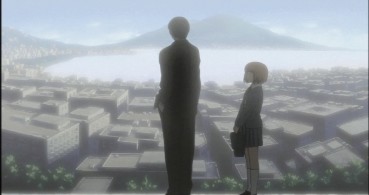"It's just the thought of these little girls who can kill terrorists
and speak three languages... and here they are, singing Beethoven
in the bitter cold. It's a shame they have to be cyborgs." |
Alfonso |
I
feel I've made all of my most pertinent comments on Gunslinger
Girl's sound and visual effects in my review for
Volume 1;
if you have yet to read it, that review goes into more detail
about the background to the story and the characters. Also
note Volume
2.
This
year's most emotionally heart-rending animé, Gunslinger
Girl draws to a close with Volume 3 (released 31st July).
Cracks begin to show in the structure of Section 2's cyborg
operation when a fratello (girl and handler) pairing
are murdered in unknown circumstances, Section 1 is brought
in to investigate, and Angelica begins to fail missions
more and more often.

Volume
3 contains four episodes; 10-13 of 13:
10:
"To Love"
Elsa and Lauro, her handler, are found dead in a forest
clearing. The head of Section 1 decides to send in two operatives
to investigate not only the murder, but the nature of Section
2's fratello.
11:
"High Fever"
The Section 1 agents meet Henrietta and José
in Sicily, where they're taking a vacation, and Henrietta
shows them what being in a fratello really means
to her.
12:
"Symbiosis"
Angelica's condition worsens as her handler Marco reluctantly
allows her out on missions. This culminates in a raid on
the revolutionary faction's main hideout, where Angelica
is almost killed.
13:
"Falling Star"
Despite Angelica's failing, life goes on as normal for the
girls of Section 2, with only a rare meteor shower to brighten
their spirits.
It's
rather sad that only here, in the final volume, does the
series present characters who may not be as comfortable
with the idea of adolescent killing machines. The two agents
from Section 1, who investigate Elsa and Lauro's deaths,
seem at first to be merely curious about the brainwashing
"conditioning" process and the level of the girls' devotion
to their handlers, but – even though it isn't said on camera
– you can tell that inside, the agents aren't as happy to
be using the children in this way as the Section 2 handlers,
who are used to the whole process.
And
that, I suppose, leads back to Gunslinger Girl's overriding question: if you could save a child's life by
giving her cybernetic implants, would you do so, even if
it meant signing her life away to be used as an assassin?
After watching the whole series of this thought-provoking
animé, I think my answer would be "yes." As the series
goes on, the viewer gets a closer look at how these girls
live. They have emotions, personal relationships, and a
desire to grow and become more than what they are. They're
not puppets controlled by a sinister government agency.
The relationships between the girls and their handlers is
what shapes their personalities; if they're treated like
tools, then that's what they'll be.
It's
interesting to see how the ones who don't have a very personal
relationship with their handler, like Triela and Claes,
are the most level-headed and unencumbered by emotions such
as love. This doesn't make them any less of a person; just
a different person than someone who's been shown affection,
like Henrietta. The bond between Henrietta and José,
I thought, was not developed as much as it could have been.
Most of the non-action, character-based episodes are about
Henrietta, and I was expecting José to crack under
the strain of having to do this to a young girl all the
time – but I suppose that would undermine Gunslinger
Girl's most prominent message: life goes on, despite
even the most horrendous circumstance. The girls have to
take every day as a blessing, and have only the little things
– the meteor shower, etc. – to give them happiness in their
lives. As I predicted when I first saw the series, there's
little or no character closure here. There doesn't need
to be.

Gunslinger
Girl is an animé that is able to scatter its
viewers' emotions, and poses some of the most thought-provoking
questions that I've ever seen. The deliberate "floaty" overexposed
animation technique benefits it greatly; my thought was
that it makes the girls' lives seem less "real", which is
precisely the point – their lives aren't "normal" or "real"
by any stretch of the imagination. More than any other series
I've seen this year, Gunslinger Girl shows us that
there's more to life – and more to the genre – than guns,
action and explosions, and I for one would like to see more
series that are unafraid to challenge viewers' moralities
and ask poignant questions.
The
anamorphic widescreen transfer is consistent with previous
volumes, with colour and detail generally pleasing, and
the slight softness and sometimes overexposed look looking
very much like deliberate artistic choices. There is a very
slight shimmer to the picture in places that could be the
result of an NTSC to PAL conversion.
Again
we have the Japanese 2.0 original soundtrack and the 5.1
surround redub, and again the English track is sonically
superior with better voice matching to the original than
many animé series.
Volume
3 is the only volume with audio commentaries; in fact, there
are two of them. The Production Commentary
features sound and visual editors, plus the packaging designer
for the series. Discussions range from the process of putting
the localised English language version into production,
to some marketing techniques used for the series. Meanwhile,
the Voice Director Commentary
– featuring all four ADR directors, two of whom also provided
character voices – is much more fun. Just like the Burst
Angel commentaries, the directors goof around and make
lame wisecracks at each other, while also providing great
insights into how the actors were cast, and how they all
viewed the series.
Once
again, there's a quick featurette on character design –
this time, Building Triel, which isn't all
that it appears – the viewer is told that "Due to security
issues, the Social Welfare Agency declined to disclose details
of Triela at this time", and instead shows another image
of Henrietta. Text-free opening and closing credits are
provided, plus the obligatory trailers: Blue Gender
and Fullmetal Alchemist
|